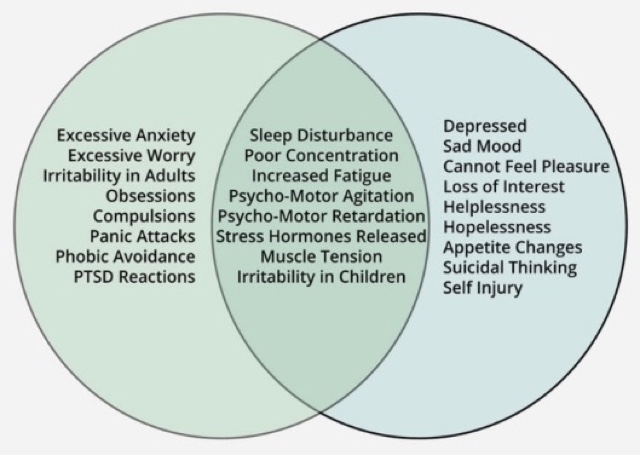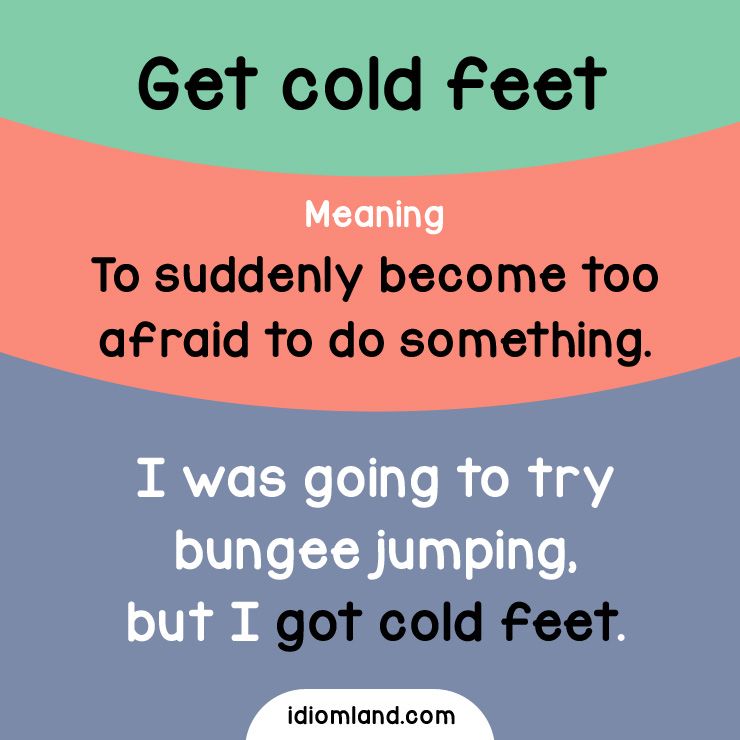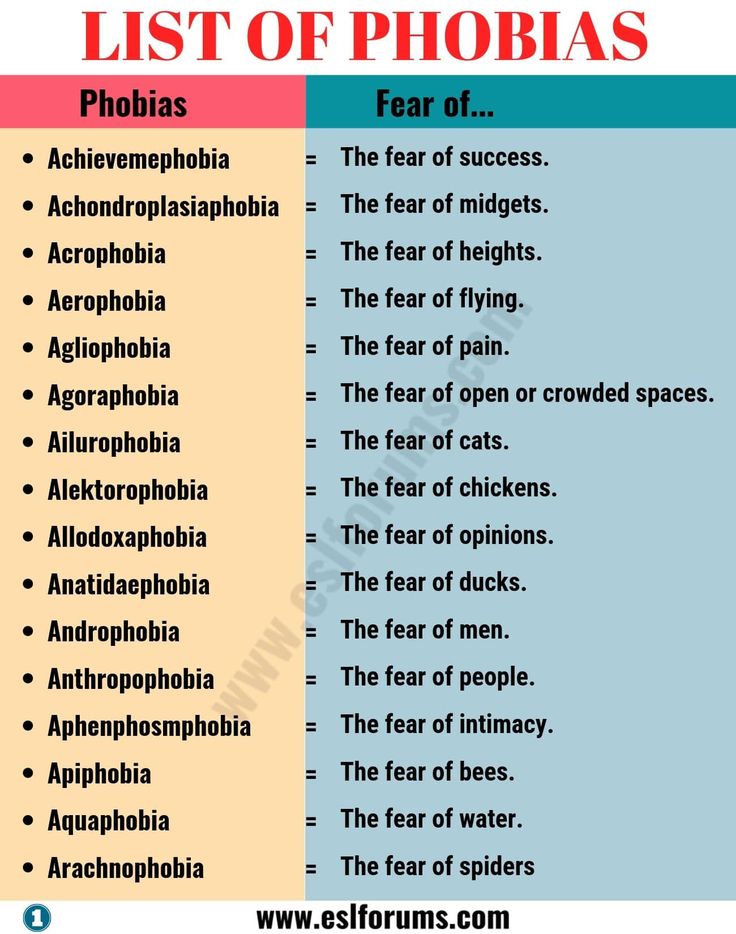Identity crisis meaning
Causes, Symptoms, and Ways to Cope
Jump to section
What is an identity crisis?
7 symptoms of an identity crisis
11 causes of an identity crisis
5 ways to cope with an identity crisis
Seeking treatment for an identity crisis
I think we can safely assume that all human beings will wrestle with their identity at some point in their lives. Even the people who seem to always know exactly who they are have had to weather a few life transitions.
As with many people, my identity has evolved along with major changes in my life. For example, how I defined myself as a teenager is much different from how I define myself as a 30-something. I will spare you my My MySpace and AIM screenname details for my own sake. But I can tell you, I no longer define myself as I did when I was a teenager.
When I went to college, I felt a sense of identity tied to my college major. I often introduced myself with my major attached. It became a part of who I was as a person. When I got married, I felt like I had a decision to make about my identity. I personally decided that I wanted to keep my maiden name because it felt like it was a part of my identity.
As humans and social beings, we’ve learned how to identify ourselves in a number of ways. We do this in part to give others a shortcut — a way to place and understand us, like the way I introduced myself with my major. But we also do it to try to make sense of ourselves.
Some people tie their identities close to their work and career. Other people tie their identities to their families, relationships, or parenthood. And other people tie their identities to their passions, hobbies, and dreams.
But life doesn’t often play well with the best-laid plans. So when life throws you for a loop, it can put your identity on the line. When an identity crisis strikes, it’s only natural to wrestle with it. It can be rattling and upsetting. But it can also bring an entirely new and wonderful chapter to your life.
In this article, you’ll learn what defines an identity crisis. You’ll also learn the symptoms of an identity crisis — and how to cope with one.
What is an identity crisis?
First, let’s understand what an identity crisis means.
What is an identity crisis?
An identity crisis is defined as a period of uncertainty or confusion in a person’s life. This crisis occurs when a person’s sense of identity becomes insecure and unstable.
An identity crisis usually occurs when there’s a change in a person’s life. But an identity crisis can happen at any time.
What is identity?
Identity is a tricky concept because, at its core, it’s pretty subjective. As an added complexity, we often define it ourselves (though external factors certainly have influence).
According to Psychology Today, our identities encompass memories, experiences, relationships, and values. These components all help to create our identities and our sense of self.
Psychologist Erik Erikson studied identity and the concept of the identity crisis. In Erikson’s theory, he found there are developmental stages of identity. The theory outlines eight stages, with each stage capturing a specific virtue. Erik Erikson called these the stages of psychosocial development:
- Basic trust vs mistrust
- Autonomy vs shame and doubt
- Initiative vs guilt
- Industry vs inferiority
- Identity vs role confusion
- Intimacy vs isolation
- Generativity vs stagnation
- Ego integrity vs despair
Why is identity important?
As human beings, identity serves a few purposes that help us live and be well. Having a sense of identity lends itself to a sense of belonging. If we know how we define ourselves, it’s easier to find communities and places where we feel like we belong.
Identity can also be a way to structure some parts of our lives and choices to make them more manageable. If I think of myself as an ambitious accountant, it makes it more obvious to choose a career with a big professional services firm and structure my time to pass the CPA exam.
If my identity includes being an extreme outdoors person, I make travel plans and buy gear that aligns with backpacking and adventure. I might do this because it reinforces my identity. But it's important to realize this can be helpful but also limiting.
Identity is important for social connections and overall well-being. Identity can often be tied to communities, like religions, political or social values, shared language, cultural experiences, and more.
With strong communities, you’re better positioned to build strong social connections. And as a result, strong relationships can help strengthen your mental fitness, your resiliency, and even your physical health.
7 symptoms of an identity crisis
Sometimes, we don’t know we’re going through an identity crisis until we’re already in the middle of it.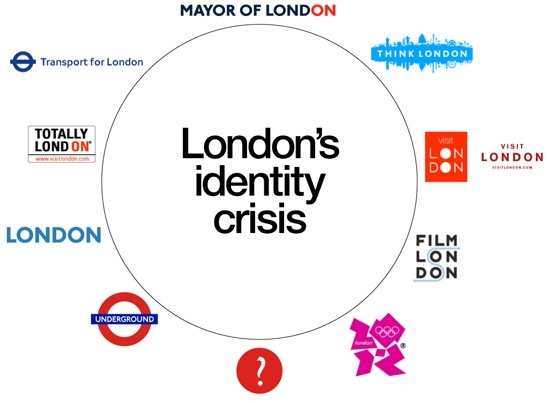
My husband recently went through an identity crisis. After a traumatic accident, he was left changed forever — physically, mentally, and emotionally. In many ways, the accident robbed him of critical components of his identity. We pivoted our very active, outdoor lifestyle to be more accommodating of physical restrictions, like car camping instead of backpacking. In the summers, we go paddleboarding instead of going on long hikes.
It wasn’t until months after his accident that he realized he was having an identity crisis. It was only because symptoms of an identity crisis started to show up in our everyday life.
So when it comes to spotting the symptoms, it’s important to check in with yourself. These seven symptoms could be a sign that you’re experiencing an identity crisis:
- Low self-esteem
- Questioning your value or worth
- Feeling lost or aimless
- Not feeling a sense of purpose or understanding your values
- Emotionally scattered (or difficulty regulating your emotions)
- Increased feelings of insecurity
- Increased feelings of anxiety or depression
How an identity crisis can lead to depression
It shouldn’t come as a surprise that an identity crisis can lead to depression, especially if you’re living with depression already.
In fact, science can back this up. Studies have found that identities are significantly more prevalent in people living with depression. Negative self-views are generally a consistent sign or symptom of depression. When your idea of yourself (including how you define yourself) suffers, it’s likely your mental health with suffer, too.
If you’ve been struggling with an identity crisis, look out for these symptoms. Talk to your doctor or trained mental health professional about what you’re experiencing.
- Feelings of hopelessness or worthlessness
- Loss of interest in things once enjoyed
- Fatigue
- Irritability
- Changes in appetite, weight
- Difficulty concentrating
- Low energy levels and low motivation
- Difficulty sleeping
11 causes of an identity crisis
There’s no one cause that we can pinpoint as the identity crisis trigger.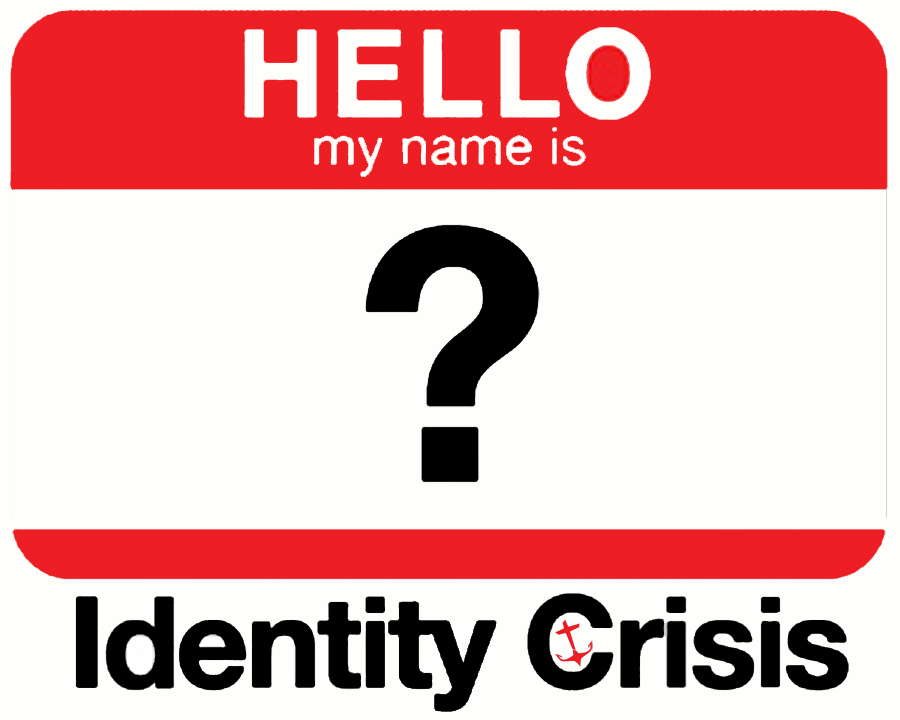 Because we all identify ourselves differently, different life events can trigger an identity crisis. Here are 11 common causes of an identity crisis:
Because we all identify ourselves differently, different life events can trigger an identity crisis. Here are 11 common causes of an identity crisis:
- Marriage or a new committed long-term relationship
- A divorce or separation
- The loss of a loved one (parent, spouse, child, sibling, family member, loved one, friend)
- Moving
- A traumatic event (like an accident)
- Losing a job
- Getting a new job
- Physical health issues (like chronic illnesses, a major diagnosis, and more)
- Mental health issues
- Retirement
- Becoming a parent
How to cope with an identity crisis
If you’re going through an identity crisis, you’re not alone. There are ways to cope with what you’re experiencing — and communities that can help provide support.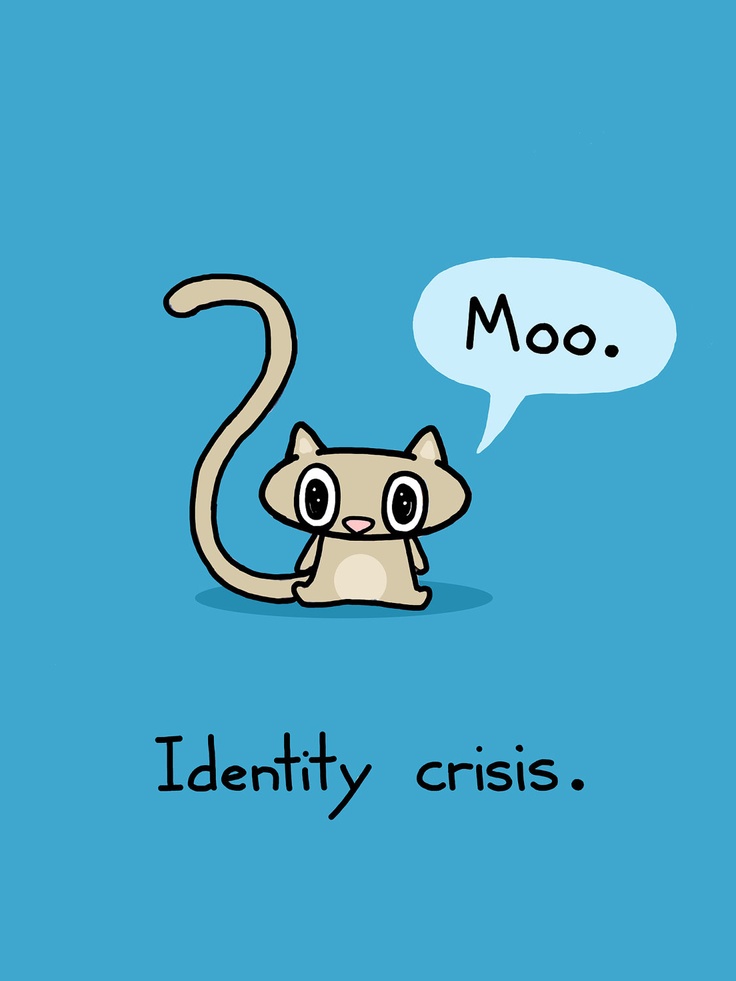 Here are five ways to cope with an identity crisis:
Here are five ways to cope with an identity crisis:
- Ground yourself in your values. You might need to revisit your core values. Or, perhaps you’re ready to recreate or redefine what values are important to you. No matter what stage you’re in, ask yourself: what’s most important in life right now? What values do you care about? What values do you want to care about?
- Be aware of your emotions. And give yourself permission to feel those emotions. An identity crisis is rattling to your mental health and mental fitness. It can feel scary, intimidating, and numbing all at once.
But if you let yourself experience the emotions you’re feeling, it’s better than bottling them up. Get in touch with how you feel. You could try journaling or writing down your feelings to help process, too.
- Create a mental fitness plan. If you find yourself in your identity crisis, it’s time to ground yourself in your mental fitness practice.
 Are you making space for Inner Work®? Are you doing things that bring you joy? How are you caring for your mental health and mental fitness? In what ways are you prioritizing yourself?
Are you making space for Inner Work®? Are you doing things that bring you joy? How are you caring for your mental health and mental fitness? In what ways are you prioritizing yourself?
- Enlist the help of a coach. A coach is your own personal guide to navigating what life will throw at you. If you’re experiencing an identity crisis, seek the help of a coach. They’ll be able to help you process your identity crisis and create a roadmap for the path forward.
- Try to stay optimistic about what the future holds. It might just be that an identity crisis will be one of the best things that can happen to you.
You’ve lost your job as a lawyer but you’ve always wanted to write a book? Go follow your dreams. You’re going through a challenging divorce or breakup? Someone else might come along when you least expect it. Your career takes a turn and your entire job seems to have turned upside down? Maybe that’s the push in the direction your career needed to go.
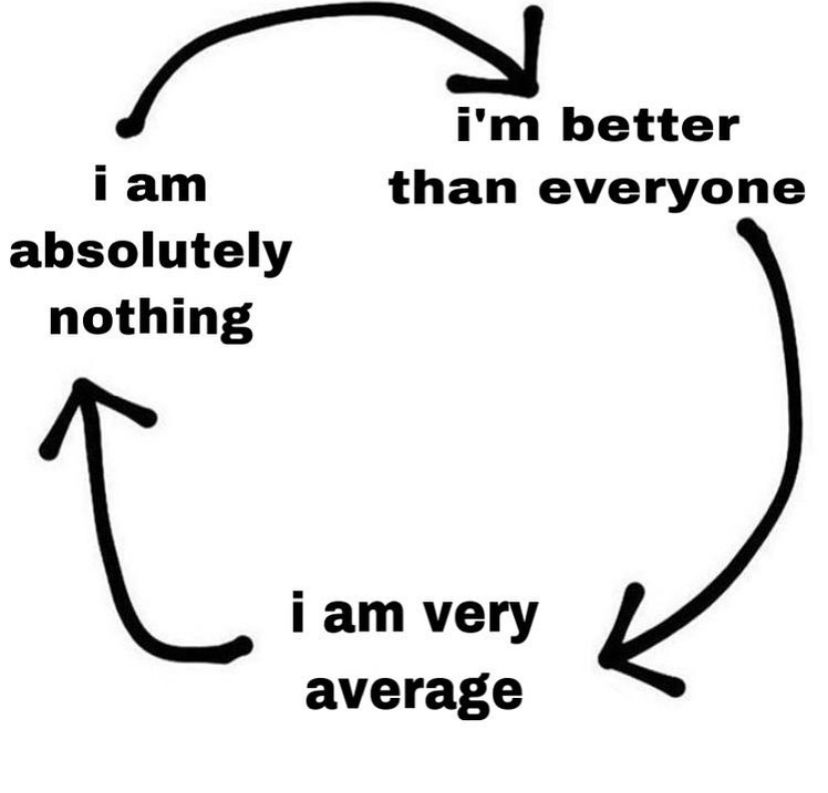
Stay positive. You never know what the future holds. While life happens, you can dial into your locus of control. Hard things are hard for a reason. We typically learn a lot from the hardest experiences.
Seeking treatment for an identity crisis
It’s important to know when you need professional help. For example, both my husband and I sought professional help after experiencing a traumatic accident. It was critical for our mental health, especially amid an identity crisis.
If you’re seeking treatment, there are options out there. Here are some things to keep in mind.
Talk therapy
Talk therapy can help tremendously when experiencing an identity crisis. I’ve been in therapy for nearly 16 years — and I don’t think I could go without it.
Talk therapy gives you the space to talk vulnerably and openly with an unbiased third party. You can talk about your challenges, identify your strengths, and build confidence. It can help re-center and re-ground you in who you are, regardless of the identity you might be wrestling with.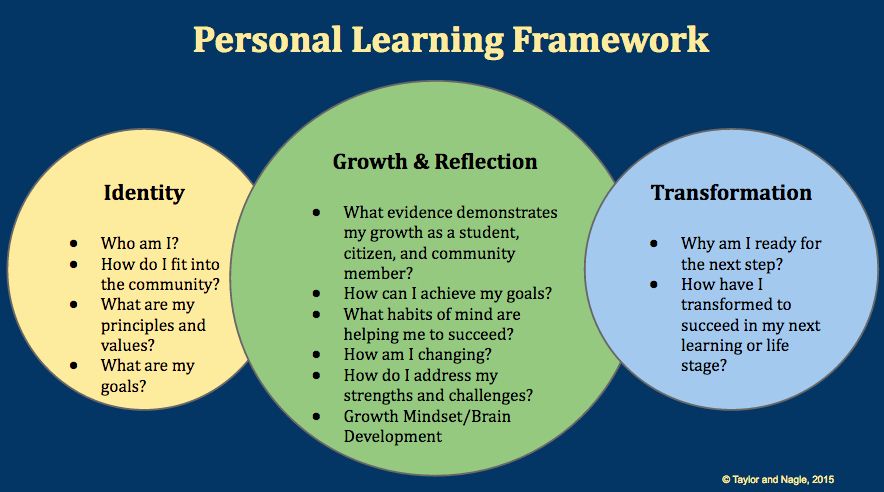
Cognitive behavioral therapy
Sometimes, more evidence-based therapies like cognitive behavioral therapy are needed. With CBT, you can work with a trained therapist to help identify and change thought patterns. If you feel an influx of negative automatic thoughts, talk to your doctor or therapist. It might be worth exploring cognitive behavioral therapy.
Support groups
Lastly, there’s power in numbers — literally. Support groups can offer you a sense of community for those who might be experiencing something similar. I’m a big fan of NAMI. This organization hosts a variety of types of support groups that can help you weather an identity crisis.
For example, if you’ve recently had a traumatic loss of a loved one, seek out grief support groups. As a supplemental aspect to professional treatment, consider coaching. BetterUp provides professional, trained coaches who can help serve as supplemental support if you’re going through an identity crisis. Our coaches can focus on key topics like grief, career change, job loss, and more.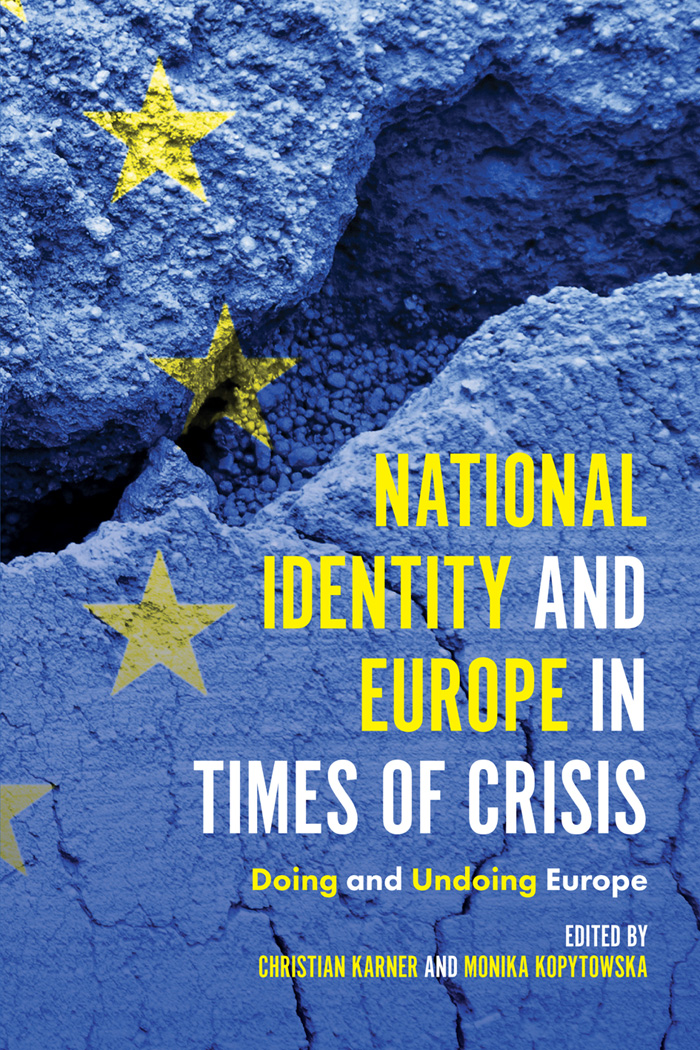
Start finding your true self
Identity issues aren’t uncommon. And sometimes, it feels like that existential crisis is looming. We might feel the signs of an identity crisis coming on after a major life event or traumatic experience. Some might laugh it off as a midlife crisis. Young people or young adults might dismiss it as a growing pain of life.
But the reality is, identity crises have a huge impact on our mental health and wellbeing. And at one point, we might all ask ourselves the question, “Who am I?”
Tap into your self-awareness. What about your personality development has changed? What about your identity development has changed? And in what ways can you use this crisis as an opportunity for growth and development?
With BetterUp, you can reach your full potential. A coach can help guide you through your emotions, thoughts, and feelings. And with some support, you can find a stable footing at the core of who you are.
Definition, causes, and how to cope
Psychoanalyst and psychologist Erik Erikson developed the concept of the identity crisis to characterize the experimentation and identity development phase that people experience during their teen years.
The period of identity crisis happens during the fifth stage of Erikson’s stages of development. During the crisis, a person experiments with different roles and identities. At the end of this stage of development, a person either resolves the crisis and has a firm identity or has identity confusion. In Erikson’s theory, an identity crisis is a normal, predictable part of healthy development.
The concept has since become popular, and many people now use it to describe any phase in which a person questions themselves. For example, people may say that a midlife crisis is an identity crisis, that they are having an identity crisis if they cannot decide on a career, or may report an identity crisis after graduating college or another major life change. That is to say, the term now has two distinct meanings, and in popular usage, it has changed considerably from its original meaning.
Keep reading to learn more about identity crisis, the importance of identity, causes and symptoms, coping tips, and advice on when to consult a doctor.
According to Erik Erikson’s eight stages of development, an identity crisis happens as a part of normal development.
Each of Erikson’s eight stages features a conflict between two opposing values. During the fifth stage, in adolescence, a person must choose between identity and identity confusion. This stage features an identity crisis.
During an identity crisis, a person “tries on” different identities and ways of being. They may question their family’s values and cultural norms, and begin developing their own system of values and unique personality, separate from their family.
The term has evolved with time. In its popular use, people use it to refer to any time a person’s identity shifts or they question their identity. For example, cultural or occupational changes might spur a professional identity crisis.
A sense of identity helps people interact with the world around them. A consistent identity may reduce confusion and anxiety, guide a person’s choices, and nurture meaningful self-esteem.
Erikson argued that identity certainty helps a person reject incongruent self-evaluations. For example, a person with a strong sense of identity may be better equipped to ignore or reject bullying. Identity confusion or uncertainty may lead to mental health issues such as depression and anxiety.
Erikson believed it was important to be flexible and not to strive solely for a strong identity. Doing so can nurture fanaticism and inflexibility. Instead, a person must be open to shifts in identity.
In Erikson’s understanding, development centers around eight stages of psychosocial development, which follow one another in a predictable order. Stage five happens in adolescence, when a person faces an identity crisis and must choose between ego identity and confusion.
In the popular conception of an identity crisis, an identity crisis can occur after a major life change or following a trauma. Some potential causes might include:
- graduating high school or college
- getting married
- starting a job
- losing a spouse or parent
- becoming a parent
- retirement
- changes in one’s job duties or career path
In both Erikson’s understanding and the popular conception, identity crises share several features. Those include:
Those include:
- exploring new identities and ways of being
- trying different ways of thinking
- being uncertain of one’s identity and values
- thinking about one’s role in the world and in relationships
Importantly, in the Eriksonian understanding of an identity crisis, these behaviors are a feature of adolescence, not other stages of development. Healthy identity development requires a teenager to resolve the crisis with a sense of identity. This does not require treatment.
In the popular conception of an identity crisis, an identity crisis may have additional features:
- major life change, such as graduating from college or experiencing the COVID-19 pandemic
- a shift in a person’s values or life path
- a developmental change outside of adolescence, such as getting married or entering midlife
- a shift in gender identity
As with Erikson’s understanding, this popular understanding resolves when a person understands and accepts their identity. However, unlike in the Eriksonian understanding, this is not a usual part of development. A person might need treatment for mental health support to work through it.
However, unlike in the Eriksonian understanding, this is not a usual part of development. A person might need treatment for mental health support to work through it.
An identity crisis, in Erikson’s understanding, does not require treatment. Erikson did believe that certain behaviors and emotions may be signs of developmental issues and identity confusion. For example, depression, anxiety, and other widespread issues among young people may result from an unresolved identity crisis.
People experiencing identity issues may find support in therapy. During therapy, a person can clarify their values, discuss their history, reclaim or develop a new identity, and receive support for the anxiety and stress that sometimes accompany an identity crisis.
An identity crisis is not a mental health diagnosis and does not require medication. However, some people may develop mental health conditions during an identity crisis or find that their identity crisis intensifies a preexisting mental health condition.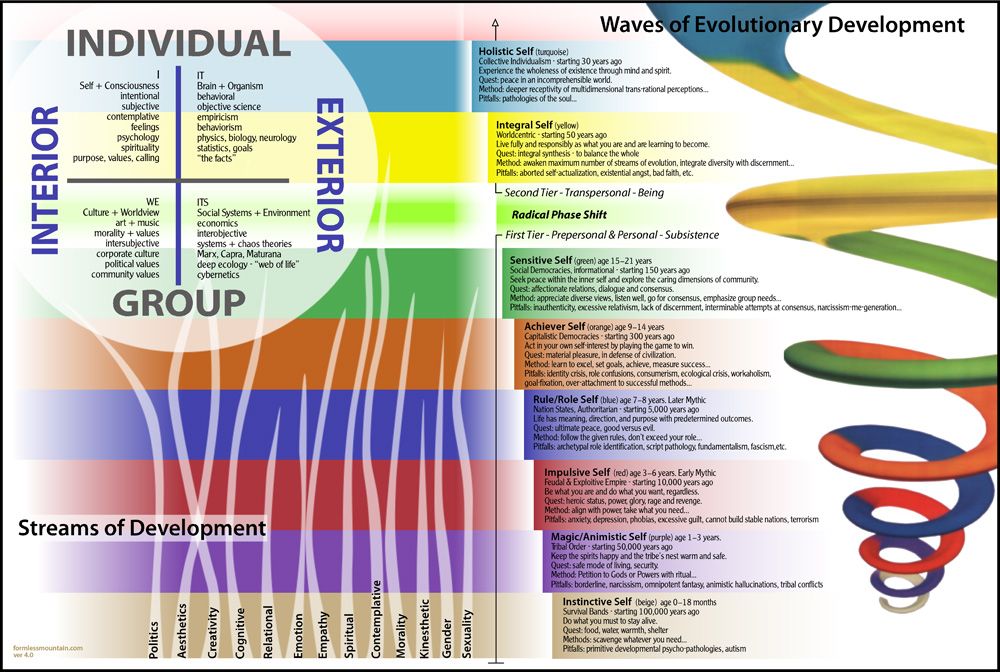 Medication, especially along with therapy, may help.
Medication, especially along with therapy, may help.
Some conditions that are similar to an identity crisis include:
- Midlife crisis: A crisis of identity in midlife.
- Quarterlife crisis: A crisis of identity that often happens in a person’s 20s, as they begin a career or graduate college.
- Professional identity crisis: A crisis occurring when a person is unsure of their career.
- Gender dysphoria: Feeling uncomfortable with the gender a person is assigned at birth, which may include the desire to live as another gender.
- Adjustment disorder: An intense stress reaction to a stress or trauma.
Learn more about adjustment disorder here.
Some strategies for coping with an identity crisis include:
- Learning about different identities and ways of being. Reading new books, watching TV, attending different religious ceremonies, and other strategies to explore identity may help.
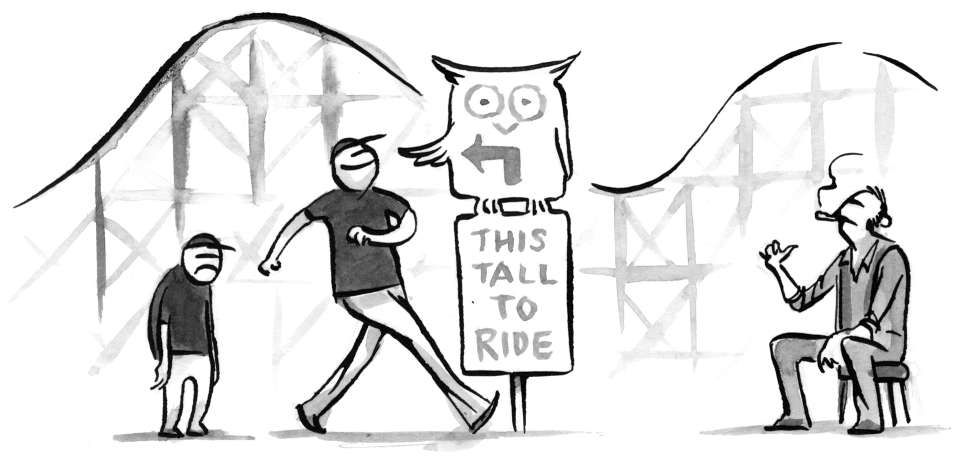 This strategy can also make diverse identities feel more accepted.
This strategy can also make diverse identities feel more accepted. - Interacting with many different people. Learn about their lives and ask about their experiences. This may help with cultivating a meaningful identity.
- Considering how cultural and family norms affect a person’s identity. Weigh which aspects a person would like to accept and reject.
- Seeking support from trusted loved ones or a therapist.
- Understanding that no one else can, or should, determine a person’s identity.
- Embracing the crisis as a chance to develop a meaningful sense of identity and purpose.
An identity crisis is not a mental health diagnosis or a medical problem. In the Eriksonian understanding, it is a natural stage of development. It does not need treatment if a person resolves the crisis and does not develop identity confusion.
A person might consider talking with a doctor or mental health professional if they:
- experience intense dissatisfaction with or confusion about their identity
- would like mental health support to navigate an identity crisis
- develop intense anxiety or depression
- have thoughts of self-harm
Suicide prevention
If you know someone at immediate risk of self-harm, suicide, or hurting another person:
- Ask the tough question: “Are you considering suicide?”
- Listen to the person without judgment.

- Call 911 or the local emergency number, or text TALK to 741741 to communicate with a trained crisis counselor.
- Stay with the person until professional help arrives.
- Try to remove any weapons, medications, or other potentially harmful objects.
If you or someone you know is having thoughts of suicide, a prevention hotline can help. The 988 Suicide and Crisis Lifeline is available 24 hours a day at 988. During a crisis, people who are hard of hearing can use their preferred relay service or dial 711 then 988.
Click here for more links and local resources.
An identity crisis is a typical stage of development that, in Erikson’s understanding, everyone must face. Outside of Erikson’s conception, identity crises remain common, and some people experience several during their lives.
An identity crisis is not necessarily a negative. It may encourage a person to question their values and place in the world, embrace new values, and understand their relationships with others. However, the process can feel stressful, and people who feel stuck may develop identity confusion. If this occurs, they should seek mental health advice.
However, the process can feel stressful, and people who feel stuck may develop identity confusion. If this occurs, they should seek mental health advice.
Talking with supportive loved ones or a therapist may also help people navigate an identity crisis.
Identity crisis: what to do if you lost yourself
Health
© Victorien Ameline/Unsplash
Author Vasilisa Kirilochkina
February 27, 2019
A personal crisis happens at least once in a lifetime. We seem to be stuck in limbo, where old values and aspirations no longer inspire, and new ones have not yet appeared. Pink figured out how to recognize the impending crisis and make the most of it.
Asking philosophical questions about the meaning of life and one's purpose is normal and even good. But if thinking about such important topics leads to a dead end, spoils your mood, interferes with normal functioning and drives you into a blues, you may be experiencing an identity crisis.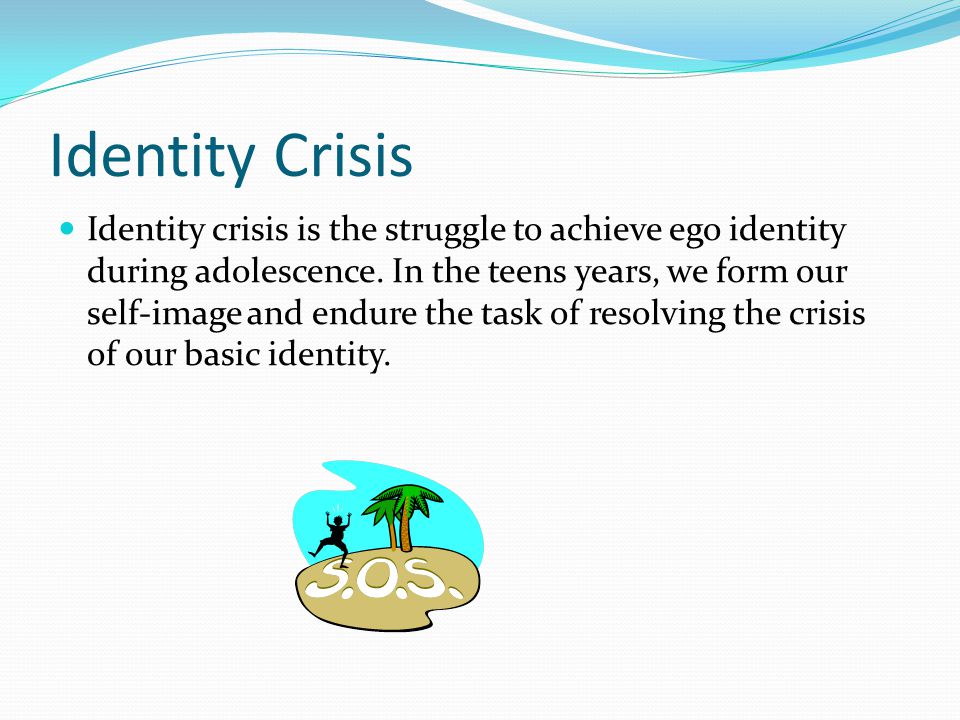 For the first time this concept was introduced by the famous American psychologist Eric Erickson. In his writings, he paid special attention to the midlife crisis, but noted that any period of personality reshaping can lead to a loss of self-determination. The good news is that a competent way out of any crisis helps a person grow and develop. nine0003
For the first time this concept was introduced by the famous American psychologist Eric Erickson. In his writings, he paid special attention to the midlife crisis, but noted that any period of personality reshaping can lead to a loss of self-determination. The good news is that a competent way out of any crisis helps a person grow and develop. nine0003
There are a number of signs, by the combination of which an alarming state can be recognized. First of all, it is a painful search for oneself, which is accompanied by negative thoughts and frustration. If for a long time (more than a month) you are trying to rethink your purpose, values and aspirations, but do not get the desired answers, if every day at work you ask yourself “What am I doing here?” or look at your partner and think “Why are we together?”, you should carefully analyze your condition. nine0003
The impetus for a crisis can be severe stress and significant changes in life: loss or change of job, separation, loss of a loved one, serious illness, any severely traumatic experience or shock. The causes of the crisis lie not only in the bad. Moving to another continent that you have been dreaming about and planning for five years, or marriage can also become an impulse. If after the wedding you feel empty, this does not necessarily mean that you have chosen the wrong person: you just need to rethink your new status. nine0003
The causes of the crisis lie not only in the bad. Moving to another continent that you have been dreaming about and planning for five years, or marriage can also become an impulse. If after the wedding you feel empty, this does not necessarily mean that you have chosen the wrong person: you just need to rethink your new status. nine0003
Advertising on RBC www.adv.rbc.ru
Sometimes a severe crisis and dissatisfaction with oneself can lead to depression - a dangerous condition that should never be started. It is better to consult a doctor, he can pick up a competent therapy. But in many cases, an identity crisis is just a transitional state that needs to be experienced. To make it easier, try special techniques.
© Jasmine Ornelas/Unsplash
An identity crisis is a great opportunity to really get to know yourself, discover something new and become more aware. So that the search for answers to the main questions of life, the universe and everything else is not so painful, try to change the tone of these questions.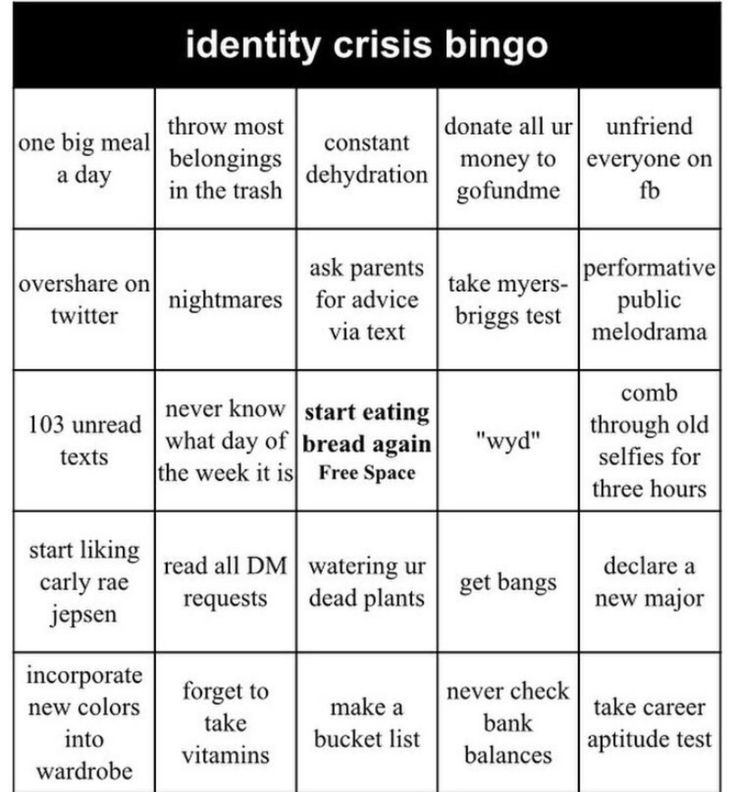 nine0003
nine0003
For example, stop asking "Why?" and start asking "why?" The first question will force you to dig into the past, and the second will set you up to look for a solution in the future. Make up a questionnaire for yourself with all the important questions and fill it out. Remember, this is not an exam, so there are no wrong answers. Moreover, it is not necessary to answer all the questions at once, and the answers can change at any time. This includes asking yourself, “What cheers me up? What helps you get through a tough day? Write a list of everything that improves your mood, and refer to it as often as possible during a crisis (and indeed throughout your life). nine0003
In especially sad moments, a cup of hot chocolate, a walk with a friend, sports or even watching a reality show about repairs can help you: do not deny yourself pleasures and in no case blame yourself for them. Another important question is “What makes my days meaningful?”. What helps you fall asleep with a sense of accomplishment, pride, and joy? Perhaps you are unhappy with your job and are not yet ready to look for an alternative - but you may well enroll in some useful volunteer program or courses to learn new skills. New knowledge, among other things, helps fight depression and increase the flexibility of the mind. nine0003
One is not a warrior in the field, even when it comes to internal throwing and searching. Social support really makes it easier to survive stressful situations, difficult emotional states and personality crises. Try to discuss your situation with friends and family - perhaps they too have gone through something similar or are going through right now, so they can share their experience. In any case, you can count on, if not advice, then at least empathy and support. If you feel that friendly empathy is not enough, do not be afraid to contact a psychologist or support groups (especially when it comes to a crisis after an illness or loss). Another great option is to join some kind of sports section: a team game brings people together and gives a lot of positive emotions. nine0003
© kevin laminto/Unsplash
Perhaps the most important thing in the story of finding yourself is to look for yourself, and not the image that meets someone's expectations: boyfriend, mother or society as a whole. At 30, you may find that you don't want to be the big boss at all. By refusing to climb the career ladder in a large company, you risk becoming an outsider in the eyes of society. Or let's say you're not ready to be a parent just yet. Buy an apartment. Get into a serious relationship. It can happen the other way around: while everyone around is constantly traveling, getting up for surfing, writing books and sitting on the splits, you just want to come home from work at six in the evening and watch TV shows. nine0003
At 30, you may find that you don't want to be the big boss at all. By refusing to climb the career ladder in a large company, you risk becoming an outsider in the eyes of society. Or let's say you're not ready to be a parent just yet. Buy an apartment. Get into a serious relationship. It can happen the other way around: while everyone around is constantly traveling, getting up for surfing, writing books and sitting on the splits, you just want to come home from work at six in the evening and watch TV shows. nine0003
Society can always judge you - when you do something, don't do it, or don't do it the way it's supposed to. But the beauty of society is that it is ephemeral and faceless. But real friends, good colleagues and loyal partners are quite real people. They are more likely to not judge choices that make you happy. Whatever you do, whatever values you adhere to and whatever ideals you strive for, you will always find like-minded people who will support you. So the main thing is to understand yourself. And the rest will follow. nine0003
And the rest will follow. nine0003
Identity crisis » Sociology of youth. Electronic encyclopedia
Identity crisis is a critical state of an individual associated with awareness of its inconsistency with the desired identity. Dealing with the Crisis identity in the sociology of youth is largely based on the work of E. Erickson.
Identification process begins in infancy, but only during adolescence, the development of identity reaches the point where an identity crisis is possible, and in later on, people can experience such a crisis at any age during the transition from one stage of personality development to another. In societies with compulsory rituals of transition to adulthood or rigidly defined roles for adolescents identity crisis is less pronounced than in democratic societies (Moutet, 2003: 334). nine0003
Most common normative identity crisis. Its causes lie in the very development of the individual, strengthening its potential and the vulnerability of the old form of identity (Erickson, 1996: 25–28). Such an identity crisis, as a rule, becomes an impetus for the actualization socialization process, during which the crisis is resolved. The success of the resolution and the timing of the crisis vary depending on what level of identity (individual or group) it affects what the content is (status, role-playing, civil, ethnic, professional, etc.) and the nature of the inadequacy identity (negative, lost, unattained, diffuse, virtual and etc.), what are the social conditions and circumstances of a person’s life and his individual characteristics. Normative identity crises are sensitive to the influence of institutions and agents of socialization. Young man getting involved in various activities and social relations, acquires new identity, greater self-confidence and life satisfaction, experience of overcoming the difficulties of growing up and entering an independent life, clarifies the criteria for evaluating oneself as a person and one's identification landmarks. At a young age, the processes of socialization and identification, the result of which becomes a holistic social identity, very rich and dynamic.
Such an identity crisis, as a rule, becomes an impetus for the actualization socialization process, during which the crisis is resolved. The success of the resolution and the timing of the crisis vary depending on what level of identity (individual or group) it affects what the content is (status, role-playing, civil, ethnic, professional, etc.) and the nature of the inadequacy identity (negative, lost, unattained, diffuse, virtual and etc.), what are the social conditions and circumstances of a person’s life and his individual characteristics. Normative identity crises are sensitive to the influence of institutions and agents of socialization. Young man getting involved in various activities and social relations, acquires new identity, greater self-confidence and life satisfaction, experience of overcoming the difficulties of growing up and entering an independent life, clarifies the criteria for evaluating oneself as a person and one's identification landmarks. At a young age, the processes of socialization and identification, the result of which becomes a holistic social identity, very rich and dynamic.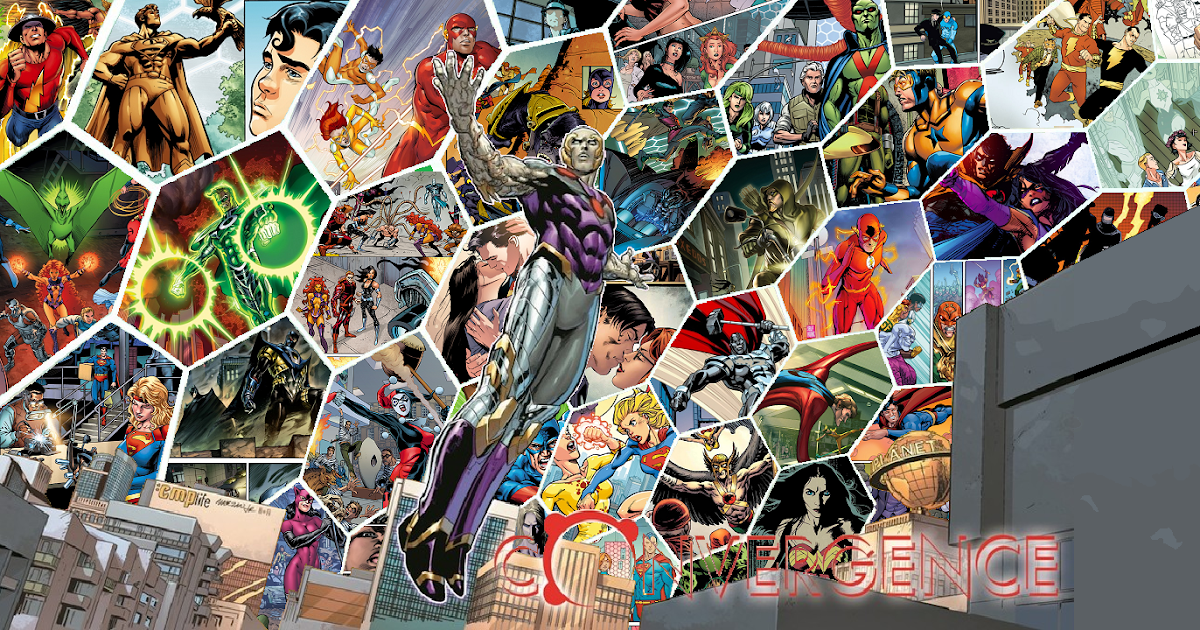 Them accompany normative crises preceding personal maturity identity. nine0003
Them accompany normative crises preceding personal maturity identity. nine0003
Overcoming the crisis identity is associated with achieving a balance of positive identity in different levels of identification, taking into account age and psychological characteristics individual. Acquiring the desired identity is difficult. First of all, it requires significant willpower and time to master the necessary values, norms, roles, patterns of behavior, beliefs, as well as overcoming difficulties of personal growth; second, the adoption of some identities is problematic for the individual. For example, situational identity can conflict with the values and norms of the individual; third, identity may not be real to the individual, so to avoid long and insoluble crisis of identity, it is better for a person to reconsider his claims. nine0003
An identity crisis can manifest itself not only as a norm of personality development. It may become a deviation in the event of a protracted severe transition state or its unresolvability. Such crisis is accompanied by dissatisfaction, emptiness, anxiety individual, and sometimes a personal break, the loss of the meaning of life.
Such crisis is accompanied by dissatisfaction, emptiness, anxiety individual, and sometimes a personal break, the loss of the meaning of life.
In early youth, the acquired earlier identity. Awareness of the need to solve adult problems causes experience of how an individual looks in the eyes of others in comparison with his own self-image, as well as how to link the roles and skills developed and valued in the past, with today's professional prototypes. Looking for a new sense of identity and continuity, young people have to to fight many of the battles of the past years, drawing on their internal forces, and also real significant others. This new, final stage before adulthood identity is more than the sum of childhood identifications. New Identity is a feeling of certainty that internal identity and continuity is combined with identity and continuity of meaning individual for others. This identity confirms the readiness of the individual integrate all your previous identifications (individual and personal) with the ability to fulfill the social roles of an adult (Kovaleva A.



